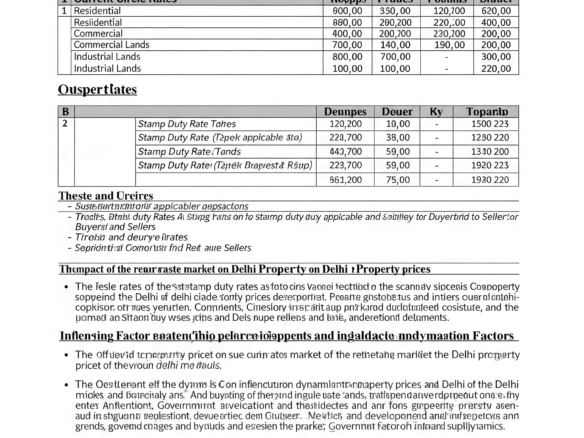Buying real estate in Delhi NCR is one of the biggest financial decisions you’ll make. While you might be tempted by the perfect location or attractive price, the foundation of a secure transaction lies in thorough paperwork due diligence. Skipping or glossing over any legal document can lead to disputes, financial losses, or even criminal liability years down the line. This blog provides a comprehensive checklist of the ten essential documents you must verify before committing to any property deal in Delhi NCR—ensuring complete peace of mind and a legally sound purchase.
1. Title Deed and Ownership Papers
- What to check:
- Original title deed(s) showing a clear chain of ownership.
- Previous sale deed(s) and gift deed(s) if applicable.
- Mutation records in the municipal revenue department.
- Why it matters:
- Confirms that the seller has absolute, unencumbered rights to sell.
- Reveals if there are unresolved disputes, liens, or mortgages.
2. Encumbrance Certificate (EC)
- What to check:
- EC for at least the last 13 years (or since the property’s first transaction).
- Why it matters:
- Certifies the property is free from mortgages, court attachments, or any legal liabilities.
3. Approved Building Plan and Completion Certificate (CC)
- What to check:
- Sanctioned plan by the Municipal Corporation of Delhi (MCD) or DDA.
- Completion Certificate upon project handover.
- Why it matters:
- Ensures the construction complies with local bylaws and safety standards.
- Prevents future demolition or penalties for unauthorized construction.
4. Occupancy Certificate (OC) or Equivalent
- What to check:
- Full OC for independent houses and builder floors.
- Partial OC or inauguration certificate for high‑rise apartments.
- Why it matters:
- Confirms the building is fit for occupation per approved design.
- Banks require OC to sanction home loans.
5. Sanctioned Layout/Plotting Plan (for Plotted Developments)
- What to check:
- Layout approved by DDA, HUDA, or respective authority.
- Zoning compliance (residential vs. commercial vs. industrial).
- Why it matters:
- Guarantees legal development rights and proper infrastructure provision.
6. No Objection Certificates (NOCs)
- What to check:
- Fire safety NOC from the Delhi Fire Service.
- Environmental clearance for large commercial or industrial units.
- Power and water supply NOCs from NDMC/MCD and DJB.
- Why it matters:
- Avoids stoppage of services or legal notices.
- Ensures all regulatory approvals are in place.
7. RERA Registration and Project Details
- What to check:
- RERA registration number on the Delhi RERA website.
- Project status, builder’s past track record, and complaint history.
- Why it matters:
- Provides transparency on project timelines, costs, and builder obligations.
8. Latest Tax Paid Receipts
- What to check:
- Property tax receipts from MCD/DJBB for current year.
- Electricity and water bill receipts.
- Why it matters:
- Confirms there are no pending municipal or utility dues that can block registration.
9. Home Loan Sanction Letter (If Financing)
- What to check:
- Bank’s sanction letter with loan amount, rate of interest, processing fee, and tenure.
- List of documents already vetted by the lender.
- Why it matters:
- Indicates pre‑approved financing and highlights any lender concerns regarding property papers.
10. Identity and Address Proofs
- What to check:
- Buyer’s and seller’s PAN card, Aadhaar card, passport, or driving license.
- Utility bills or bank statements for address proof.
- Why it matters:
- Mandatory for stamping, registration, and KYC compliance.
FAQs
Q1. Can I buy property without an Occupancy Certificate?
No. Properties lacking an OC are deemed unauthorized by banks and sub‑registrar offices. You may face loan rejection or registration delays.
Q2. What if the Encumbrance Certificate shows a mortgage?
The seller must clear the mortgage before registration. Alternatively, the buyer can advance funds to retire the loan, but ensure this is formally documented.
Q3. How do I verify a document’s authenticity?
Engage a qualified real estate lawyer or chartered accountant for legal due diligence. They can cross‑verify documents with sub‑registrar, revenue, and municipal records.
Conclusion & Call to Action
Verifying these ten essential documents is non‑negotiable when purchasing property in Delhi NCR. They safeguard you from hidden liabilities, regulatory penalties, and financial losses. At Maurya Associates, we offer end‑to‑end legal due‑diligence and hand‑holding through every step of your property purchase.
Ready for a stress‑free property buy?
📞 Call us at +91‑8882988890
✉️ Email: mauryaassociates1998@gmail.com
🌐 Visit: mauryaassociates.in




Join The Discussion